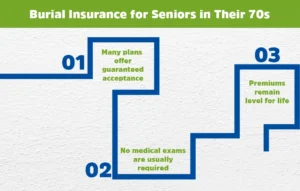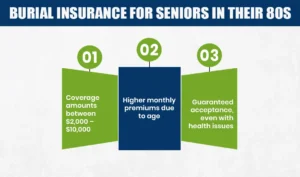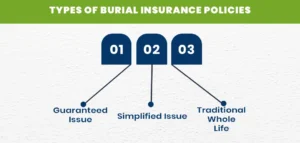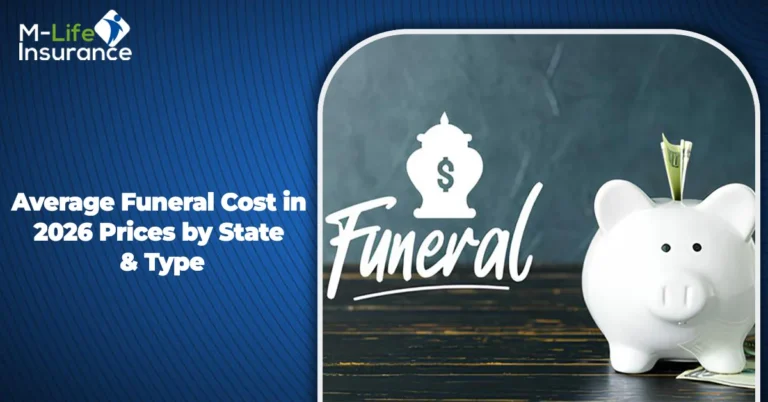Last Updated on: September 29th, 2025
- Licensed Agent
- - @M-LifeInsurance
Key Points
- Affordable coverage is important
- Age affects monthly payments
- Comparing multiple plans saves money
- Helps protect loved ones from financial stress
Planning for end-of-life expenses is not something that people like to think about, but this is considered as one of the most important thing that you can do for your family and loved ones. This is why many seniors look for free or low-cost burial insurance that can bring peace of mind.
Completely free burial insurance is something that is hard to find. But, there are some government programs giving you benefits, or nonprofit help that can cover part of the expenses. Apart from that, there are affordable burial insurance policies that are available for seniors in their 60s, 70s, 80s, and even 90s. This guide explains what burial insurance is, available choices by age, and how to pick the right plan.
What is Burial Insurance for Seniors?
Burial insurance, that is also called final expense insurance or funeral insurance, is a type of small whole life insurance policy designed to cover:
- Funeral service fees
- Cremation or burial costs
- Other end-of-life expenses
These plans are not like large regular life insurance policies, burial insurance provides smaller payouts, usually that are enough to cover funeral expenses. The main goal is to make sure that families don’t have to face sudden financial stress.
Can Seniors Really Get Free Burial Insurance?
When seniors search for any free burial insurance, they are usually hoping for no-cost coverage. In reality, fully free options are very limited. However, a few programs can help you:
Medicaid or State Help
Some states provide limited financial help for funeral or burial costs if you are on Medicaid. The amount of help depends on the state, but it can cover part of the expenses so your family doesn’t have to pay the full cost.
Veterans Benefits
If you are a veteran, you can qualify for free burial and memorial benefits. This will include a gravesite in a national cemetery, a headstone, and sometimes it also help with funeral costs. These benefits can greatly reduce the financial burden for your family.
Nonprofit Groups
There are also some nonprofit organizations and charities that offer and help the to low-income seniors. They may help cover funeral expenses, provide discounts, or connect families with resources to make final arrangements more affordable.
Burial Insurance for Seniors in Their 60s
For seniors around age 60, insurance is still affordable. At this age, most insurance companies consider you lower risk as compared to the older age groups. There are common benefits that can include coverage up to $25,000, also there is no medical exams required to qualify and there will be lower monthly payments compared to 70+
Buying coverage in your 60s is often the best time to lock in lower rates before premiums increase with age.
Burial Insurance for Seniors in Their 70s
Once seniors reach their 70s, coverage is still available but monthly premiums are higher than for those in their 60s. The good news is:
- Many plans offer guaranteed acceptance
- No medical exams are usually required
- Premiums remain level for life
The smartest move is that you have to compare different prices from different insurance companies before making a decision. Doing this will make sure that you get the best value.

Burial Insurance for Seniors in Their 80s
Even in your 80s, it’s still possible to get burial insurance. These plans are designed to help cover final expenses so families aren’t left with bills. Policies often include:
- Coverage amounts between $2,000 – $10,000
- Higher monthly premiums due to age
- Guaranteed acceptance, even with health issues

Low-Cost Burial Insurance for Seniors
Not everyone has the same budget. Seniors looking for affordable coverage can keep costs down by choosing smaller coverage amounts that are just enough for funeral expenses, they can compare prices from multiple insurance companies and also Looking at group plans like AARP burial insurance.
Types of Burial Insurance Policies
There are three main kinds of burial insurance policies:
- Guaranteed Issue is the plan that has no health questions or exams, but usually a waiting period before full benefits.
- Simplified Issue comes with a few health questions asked, but if you qualify, monthly premiums are lower.
- Traditional Whole Life has the higher coverage amounts, but may require medical exams.

How Much Does Life Isurance Cost?
Pros and Cons of Burial Insurance
Pros
- Burial insurance gives families peace of mind by covering final expenses.
- Most plans do not require a medical exam, making it easy to qualify.
- Many policies offer guaranteed acceptance, even for seniors with health issues.
- Premiums remain the same for life, so costs will not increase as you get older.
Cons
- You must pay monthly premiums to keep the coverage active.
- If you buy the policy later in life then the premiums will be higher.
- Coverage amounts are limited, usually between $2,000 and $25,000.
- Some policies have a two-year waiting period before full benefits are paid out.
How to Pick the Right Burial Insurance
When choosing a burial insurance plan, you have to keep some of the important things in mind:
- First you have to estimate how much your funeral, burial, or cremation will cost. Choose a plan that matches.
- Also make sure that the monthly premiums are not too high so that they fit comfortably into your budget.
- Pick a insurance company that comes with a strong reputation and good financial stability.
- Always check multiple companies before making your decision.
AARP Burial Insurance for Seniors
AARP offers burial insurance policies with guaranteed acceptance through trusted insurance providers. While not always the cheapest, it’s a popular choice for seniors who want reliable coverage from a known name.
Funeral Insurance for Seniors
Some burial insurance plans are created just to handle funeral expenses. The money from these plans are specially for the families to cover important final expenses such as funeral service, burial or cremation, and memorial arrangements. In this way, your loved ones do not have to worry about paying out of pocket during that difficult time. Having these type of plans will give you peace of mind knowing that all the basic end-of-life costs are already taken care of.
Final Thoughts
Completely free burial insurance for seniors is very hard to find, but there are some affordable plans available at every age. If you buy the plan early then there will be low monthly premiums for you. You just have to make sure that you can take time to compare prices from different insurance companies and choose one that best fits your needs and budget.
Protect your loved ones today with Mlife Insurance. Get a free burial insurance quote and find the right plan for your needs and budget.
FAQs
Is there a free burial policy for seniors?
No, there is no full free burial policy. But some programs like Medicaid, Social Security, or veterans’ benefits can give small help with funeral costs.
What is the $40,000 burial benefit?
It is a life insurance policy that pays up to $40,000. The money can be used for funeral costs or other final expenses.
What is the best burial insurance for senior citizens?
The best plan is one that fits your budget, covers the funeral expenses, and comes from a trusted insurance company.
Who pays for a funeral if there is no life insurance?
If there is no insurance, the family usually has to pay. In some cases, local governments or charities may give limited help.

Joyce Espinoza, Expert Life Insurance Agent
Joyce Espinoza is a trusted life insurance agent at mLifeInsurance.com. She’s been in the insurance industry for over ten years, helping people, especially those with special health conditions to find the right coverage. At MLife Insurance, Joyce writes easy-to-understand articles that help readers make smart choices about life insurance. Previously, she worked directly with clients at Mlife Insurance, advising nearly 3,000 of them on life insurance options.





